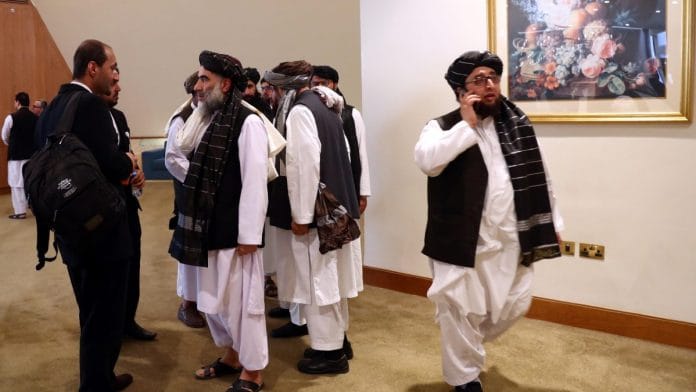New Delhi: As the Taliban consolidates its position in Afghanistan, having secured Kabul Sunday, speculation is rife on who will now lead the country.
A predominantly Pashtun-led Islamic fundamentalist group, the Taliban ruled in Afghanistan from 1996 until 2001, when the US invaded the country following the September 11 attacks.
There is little clarity on whom the terror group will nominate to lead the country. But it does have a top echelon.
ThePrint takes a look at potential Taliban leaders who could lead the country following a complete takeover by the insurgents.
Also read: How Taliban’s expansion in Afghanistan could signal rise of Bangladesh-based terror group
Haibatullah Akhundzada — Supreme leader
Haibatullah Akhundzada, 60, the current supreme leader of the Taliban military group, took charge of the group following the assassination of his predecessor Mullah Mansour Akhtar in a US drone strike in 2016.
Born in Kandahar, the southern province of Afghanistan widely known as the birthplace of the Taliban movement, Akhundzada joined the group the same year it came into being in 1994.
Following the death of Mansour, he was expected to unify the Taliban movement that was experiencing several divisions, with a section of unhappy leaders alleging that Mansour had deceived them by hiding the news of the death of Taliban founder Mullah Omar for more than a year.
Akhundzada, a religious figure known to keep to himself, was then called “the emir of the faithful” by Al Qaeda chief Ayman al-Zawahiri, helping him secure his jihadi credentials with the group’s long-time allies.
He, however, is being seen more as an Islamic cleric with no military experience, and has been mostly in charge of issuing the Taliban’s fatwas (official religious statements or orders).
Akhundzada is also said to have operated a religious school near Quetta, a city located in northern Balochistan near the Pakistan-Afghanistan border, which many top Taliban commanders attended.
According to a report published by Afghanistan daily Hasht-e-Subh early this year, however, Akhundzada died along with several other Taliban leaders in a bomb blast at a safe house in Balochistan, Pakistan, last year.
While top leaders have denied these allegations, it is still unclear where he is currently at.
Sirajuddin Haqqani –– head of the Haqqani Network
Sirajuddin Haqqani, 48, the son of the infamous Afghan guerrilla commander Jalaluddin Haqqani who fought Soviet forces in the 1980s and joined the Taliban in 1996, has dual roles — deputy leader of the Taliban and the head of the Haqqani Network, a US-designated terror group believed to have been among the most dangerous groups revolting against the Afghan government and US-led NATO forces for the past two decades.
Known for carrying many high-profile attacks using suicide bombers, the militant network has also been accused of killing top Afghan officials and kidnapping Western citizens for ransom, including US soldier Bowe Bergdahl, who was released in 2014 after five years of captivity.
The Haqqani network oversees operations in the rugged-isolated mountains of eastern Afghanistan but is said to enjoy considerable weight over the Taliban’s leadership council.
Advocating for peace in an opinion article published in The New York Times last year, Sirajuddin wrote, “We did not choose our war with the foreign coalition led by the United States. We were forced to defend ourselves. The withdrawal of foreign forces has been our first and foremost demand.”
Also read: US’ failure to push back Pakistan has brought Taliban to Kabul. India had seen it coming
Mullah Yaqoob — Mullah Omar’s son
Mullah Yaqoob, aged 31, is the son of the Taliban founder Mullah Omar and leads the insurgency’s powerful military commission, which is responsible for looking after a vast network of shadow governors and battlefield commanders who execute the Taliban’s strategic operations.
While his father earned a cult-like status as a leader for having successfully unified the Taliban movement since its launch in 1994, analysts believed that his appointment to the role last year was merely cosmetic.
Suhail Shaheen — Taliban spokesman
Another name that has also made headlines is Taliban spokesman Suhail Shaheen.
Suhail studied at the International Islamic University in Islamabad, Pakistan and later Kabul University. He secured the job of an editor at the Kabul Times, the first state-owned English newspaper, during the Islamic Emirate of Afghanistan.
Fluent in both Pashto and English, Suhail was appointed as the deputy ambassador at the Afghan Embassy in Pakistan and now serves as spokesman for the Taliban Political Office in Qatar.
Also Read: Why Taliban’s lightning-fast advance will be felt beyond Afghanistan’s borders






